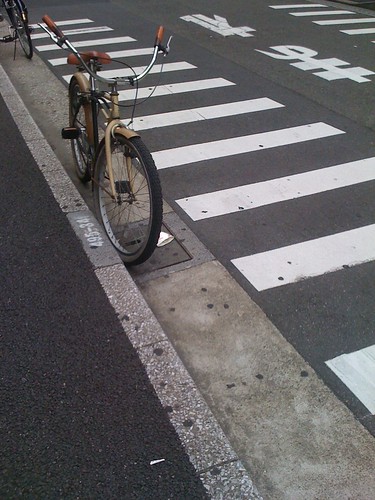 Here's a third rule about leaving out relative pronouns:
Here's a third rule about leaving out relative pronouns:It's OK to leave out "which" when the relative clause is an essential one. It's not OK to leave out "which" in a nonessential relative clause.For a review on essential and nonessential relative clauses, see this post:
http://upgradeenglish.blogspot.com/2009/08/part-9-comma-or-no-comma.htmlNow look at some examples:
○ I took a photo of a bike which I feel is strange.If I find one (which is) at a bike shop, I'm going to try it to see just how uncomfortable it is. I'm really curious about it.
○ I took a photo of a bike I feel is strange.
× This photo, I took near Shinochanomizu Station, is of a type of bicycle I've seen a lot lately.
○ This photo, which I took near Shinochanomizu Station, is of a type of bicycle I've seen a lot lately.
× The bicycle, has motorcycle styling, really puzzles me.
○ The bicycle, which has motorcycle styling, really puzzles me.× The handlebars, point up and outwards, seem really hard to grasp.
- styling スタイリング、あるスタイルを与えること、様式{ようしき}、整髪{せいはつ}
- 迷わす (まよわす) (v5s,vt) to puzzle; perplex; bewilder; delude; mislead; fascinate;
○ The handlebars, which point up and outwards, seem really hard to grasp.○ I can't imagine how the owner of the bicycle which I photographed rides it.
- handlebars - ハンドル
- 把持 (はじ) (n,vs) grasp; hold; grip;
- 握る (にぎる) (v5r,vt) to grasp; to seize; to mould sushi; to mold sushi; (P);
- 外向き (そとむき) (n) facing outward;
- 外形的 (がいけいてき) (adj-na) external; outward;
○ I can't imagine how the owner of the bicycle I photographed rides it.
Enjoy the last few hours of the weekend!

0 件のコメント:
コメントを投稿